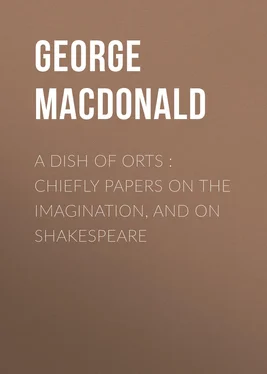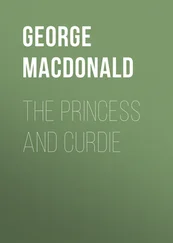George MacDonald - A Dish of Orts - Chiefly Papers on the Imagination, and on Shakespeare
Здесь есть возможность читать онлайн «George MacDonald - A Dish of Orts - Chiefly Papers on the Imagination, and on Shakespeare» — ознакомительный отрывок электронной книги совершенно бесплатно, а после прочтения отрывка купить полную версию. В некоторых случаях можно слушать аудио, скачать через торрент в формате fb2 и присутствует краткое содержание. Жанр: Биографии и Мемуары, Критика, foreign_antique, foreign_prose, на английском языке. Описание произведения, (предисловие) а так же отзывы посетителей доступны на портале библиотеки ЛибКат.
- Название:A Dish of Orts : Chiefly Papers on the Imagination, and on Shakespeare
- Автор:
- Жанр:
- Год:неизвестен
- ISBN:нет данных
- Рейтинг книги:4 / 5. Голосов: 1
-
Избранное:Добавить в избранное
- Отзывы:
-
Ваша оценка:
- 80
- 1
- 2
- 3
- 4
- 5
A Dish of Orts : Chiefly Papers on the Imagination, and on Shakespeare: краткое содержание, описание и аннотация
Предлагаем к чтению аннотацию, описание, краткое содержание или предисловие (зависит от того, что написал сам автор книги «A Dish of Orts : Chiefly Papers on the Imagination, and on Shakespeare»). Если вы не нашли необходимую информацию о книге — напишите в комментариях, мы постараемся отыскать её.
A Dish of Orts : Chiefly Papers on the Imagination, and on Shakespeare — читать онлайн ознакомительный отрывок
Ниже представлен текст книги, разбитый по страницам. Система сохранения места последней прочитанной страницы, позволяет с удобством читать онлайн бесплатно книгу «A Dish of Orts : Chiefly Papers on the Imagination, and on Shakespeare», без необходимости каждый раз заново искать на чём Вы остановились. Поставьте закладку, и сможете в любой момент перейти на страницу, на которой закончили чтение.
Интервал:
Закладка:
George MacDonald
A Dish of Orts : Chiefly Papers on the Imagination, and on Shakespeare
PREFACE
Since printing throughout the title Orts , a doubt has arisen in my mind as to its fitting the nature of the volume. It could hardly, however, be imagined that I associate the idea of worthlessness with the work contained in it. No one would insult his readers by offering them what he counted valueless scraps, and telling them they were such. These papers, those two even which were caught in the net of the ready-writer from extempore utterance, whatever their merits in themselves; are the results of by no means trifling labour. So much a man ought to be able to say for his work. And hence I might defend, if not quite justify my title—for they are but fragmentary presentments of larger meditation. My friends at least will accept them as such, whether they like their collective title or not.
The title of the last is not quite suitable. It is that of the religious newspaper which reported the sermon. I noted the fact too late for correction. It ought to be True Greatness .
The paper on The Fantastic Imagination had its origin in the repeated request of readers for an explanation of things in certain shorter stories I had written. It forms the preface to an American edition of my so-called Fairy Tales.
GEORGE MACDONALD.
EDENBRIDGE, KENT. August 5, 1893.
THE IMAGINATION: ITS FUNCTIONS AND ITS CULTURE
[Footnote: 1867.]
There are in whose notion education would seem to consist in the production of a certain repose through the development of this and that faculty, and the depression, if not eradication, of this and that other faculty. But if mere repose were the end in view, an unsparing depression of all the faculties would be the surest means of approaching it, provided always the animal instincts could be depressed likewise, or, better still, kept in a state of constant repletion. Happily, however, for the human race, it possesses in the passion of hunger even, a more immediate saviour than in the wisest selection and treatment of its faculties. For repose is not the end of education; its end is a noble unrest, an ever renewed awaking from the dead, a ceaseless questioning of the past for the interpretation of the future, an urging on of the motions of life, which had better far be accelerated into fever, than retarded into lethargy.
By those who consider a balanced repose the end of culture, the imagination must necessarily be regarded as the one faculty before all others to be suppressed. “Are there not facts?” say they. “Why forsake them for fancies? Is there not that which, may be known ? Why forsake it for inventions? What God hath made, into that let man inquire.”
We answer: To inquire into what God has made is the main function of the imagination. It is aroused by facts, is nourished by facts; seeks for higher and yet higher laws in those facts; but refuses to regard science as the sole interpreter of nature, or the laws of science as the only region of discovery.
We must begin with a definition of the word imagination , or rather some description of the faculty to which we give the name.
The word itself means an imaging or a making of likenesses. The imagination is that faculty which gives form to thought—not necessarily uttered form, but form capable of being uttered in shape or in sound, or in any mode upon which the senses can lay hold. It is, therefore, that faculty in man which is likest to the prime operation of the power of God, and has, therefore, been called the creative faculty, and its exercise creation . Poet means maker . We must not forget, however, that between creator and poet lies the one unpassable gulf which distinguishes—far be it from us to say divides —all that is God’s from all that is man’s; a gulf teeming with infinite revelations, but a gulf over which no man can pass to find out God, although God needs not to pass over it to find man; the gulf between that which calls, and that which is thus called into being; between that which makes in its own image and that which is made in that image. It is better to keep the word creation for that calling out of nothing which is the imagination of God; except it be as an occasional symbolic expression, whose daring is fully recognized, of the likeness of man’s work to the work of his maker. The necessary unlikeness between the creator and the created holds within it the equally necessary likeness of the thing made to him who makes it, and so of the work of the made to the work of the maker. When therefore, refusing to employ the word creation of the work of man, we yet use the word imagination of the work of God, we cannot be said to dare at all. It is only to give the name of man’s faculty to that power after which and by which it was fashioned. The imagination of man is made in the image of the imagination of God. Everything of man must have been of God first; and it will help much towards our understanding of the imagination and its functions in man if we first succeed in regarding aright the imagination of God, in which the imagination of man lives and moves and has its being.
As to what thought is in the mind of God ere it takes form, or what the form is to him ere he utters it; in a word, what the consciousness of God is in either case, all we can say is, that our consciousness in the resembling conditions must, afar off, resemble his. But when we come to consider the acts embodying the Divine thought (if indeed thought and act be not with him one and the same), then we enter a region of large difference. We discover at once, for instance, that where a man would make a machine, or a picture, or a book, God makes the man that makes the book, or the picture, or the machine. Would God give us a drama? He makes a Shakespere. Or would he construct a drama more immediately his own? He begins with the building of the stage itself, and that stage is a world—a universe of worlds. He makes the actors, and they do not act,—they are their part. He utters them into the visible to work out their life—his drama. When he would have an epic, he sends a thinking hero into his drama, and the epic is the soliloquy of his Hamlet. Instead of writing his lyrics, he sets his birds and his maidens a-singing. All the processes of the ages are God’s science; all the flow of history is his poetry. His sculpture is not in marble, but in living and speech-giving forms, which pass away, not to yield place to those that come after, but to be perfected in a nobler studio. What he has done remains, although it vanishes; and he never either forgets what he has once done, or does it even once again. As the thoughts move in the mind of a man, so move the worlds of men and women in the mind of God, and make no confusion there, for there they had their birth, the offspring of his imagination. Man is but a thought of God.
If we now consider the so-called creative faculty in man, we shall find that in no primary sense is this faculty creative. Indeed, a man is rather being thought than thinking , when a new thought arises in his mind. He knew it not till he found it there, therefore he could not even have sent for it. He did not create it, else how could it be the surprise that it was when it arose? He may, indeed, in rare instances foresee that something is coming, and make ready the place for its birth; but that is the utmost relation of consciousness and will he can bear to the dawning idea. Leaving this aside, however, and turning to the embodiment or revelation of thought, we shall find that a man no more creates the forms by which he would reveal his thoughts, than he creates those thoughts themselves.
Читать дальшеИнтервал:
Закладка:
Похожие книги на «A Dish of Orts : Chiefly Papers on the Imagination, and on Shakespeare»
Представляем Вашему вниманию похожие книги на «A Dish of Orts : Chiefly Papers on the Imagination, and on Shakespeare» списком для выбора. Мы отобрали схожую по названию и смыслу литературу в надежде предоставить читателям больше вариантов отыскать новые, интересные, ещё непрочитанные произведения.
Обсуждение, отзывы о книге «A Dish of Orts : Chiefly Papers on the Imagination, and on Shakespeare» и просто собственные мнения читателей. Оставьте ваши комментарии, напишите, что Вы думаете о произведении, его смысле или главных героях. Укажите что конкретно понравилось, а что нет, и почему Вы так считаете.












